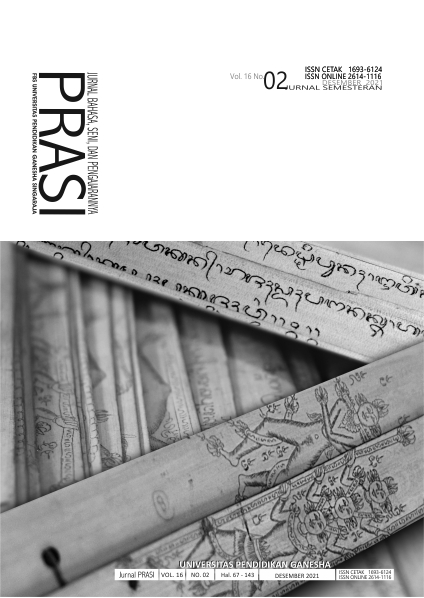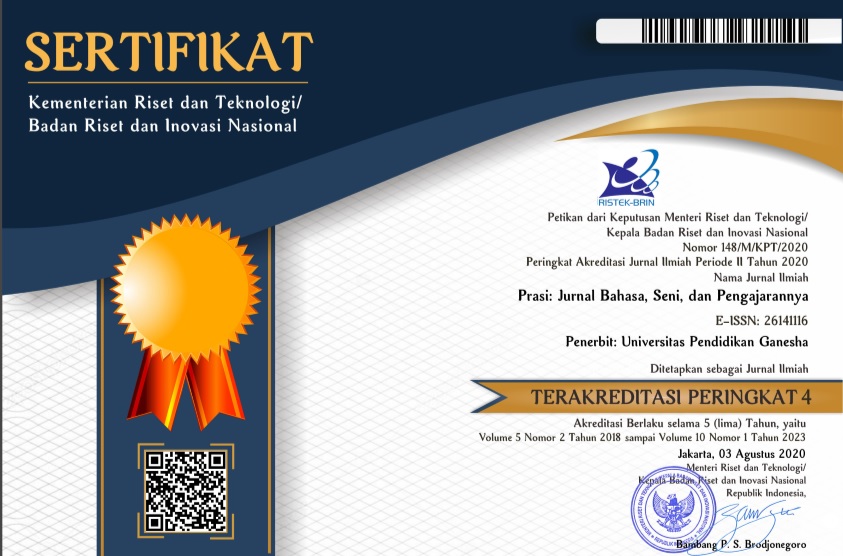THE ANALYSIS OF STUDENTS’ E-LEARNING READINESS ON ENGLISH LEARNING PROCESS
DOI:
https://doi.org/10.23887/prasi.v16i02.40454Keywords:
e-learning, e-learning readiness, distance learningAbstract
The process of English Learning before and during Covid-19 pandemic is very difference. The learning process which is conducted at school has changed into distance learning process. All schools are required to implement e-learning to support the distance learning process. This study was aimed at analyzing students’ e-learning readiness toward the implementation of e-learning at SMK Negeri 1 Kubutambahan. A mixed-method research design utilizing concurrent embedded model which is a quantitative method as a primer method was employed in this study. A questionnaire of students’ e-learning readiness and an observation sheet were used to collect the data. The obtained data were then analyzed quantitatively and qualitatively. The result of the study showed that the readiness of SMK Negeri 1 Kubutambahan students in using e-learning in the context of distance learning is classified on ready category which still needs some improvement. From the four aspects of readiness assessed, there is one aspect that belongs to unready category that requires a little improvement, namely the technological aspect. Meanwhile, the other three aspects, namely aspects of innovation, people, and self-development belong to the ready category which requires a little improvement in its implementation.
References
Aydin, C. H. & Tasci D. (2005). Measuring Readiness for e-Learning: Reflections from an Emerging country. Educational Technology & Society, 8(4).
Demir Kaymak, Z., & Horzum, M. B. (2013). Relationship between Online Learning Readiness and Structure and Interaction of Online Learning Students. Kuram ve Uygulamada Egitim Bilimleri, 13(3), 1792–1797. https://doi.org/10.12738/estp.2013.3.1580
Hadining, A. F., Sukanta, & Hidayat, W. (2019). An Investigation of Student Perspective for E-Learning Readiness Measurement. Proceedings of the International Conference on Industrial Engineering and Operations Management, 2019(MAR), 548–555.
Hashim, H., & Tasir, Z. (2014). E-learning readiness. Proceedings - 2014 International Conference on Teaching and Learning in Computing and Engineering, LATICE 2014, April 2014, 267–271. https://doi.org/10.1109/LaTiCE.2014.58
Haughey, M. dan Anderson, T. (1998). Networking Learning: The Pedagogy of the Internet. Montreal: Cheneliere/McGraw-Hill.
Isman, Mhd. (2016). Pembelajaran Media dalam Jaringan (Moda Jaringan). The Progressive and Fun Education Seminar, 586.
Keller, C., & Cernerud, L. (2002). Students’ Perceptions of E-learning in University Education. Journal of Educational Media, 27(1–2), 55–67. https://doi.org/10.1080/0305498032000045458
Kristina, M., Sari, R. N., & Nagara, E. S. (2020). Model Pelaksanaan Pembelajaran Daring pada Masa Pandemi Covid 19 di Provinsi Lampung. IV(2), 200–209.
Mudawamah, N. S. (2020). Perilaku Pengguna Internet : Studi Kasus pada Mahasiswa Jurusan Perpustakaan dan Ilmu Informasi UIN Maulana Malik Ibrahim. Jurnal Kajian Perpustakaan dan Informasi, Vol. 4 No.(1), 107–113. http://journal2.um.ac.id/index.php/bibliotika/article/download/14762/6000
Muryani, C. (2017). Importance Developing E-Learning for High School Students in Sragen Regency, Central Java. IJPTE : International Journal of Pedagogy and Teacher Education, 1(2). https://doi.org/10.20961/ijpte.v1i2.14884
Ramadan, R., Pradnyana, I. M. A., & Suyasa, P. W. A. (2019). Pengukuran Tingkat Kesiapan Implementasi E-Learning (E-Learning Readiness) di SMAN 2 Singaraja Menggunakan Model Chapnick. Jurnal Pendidikan Teknologi Dan Kejuruan, 16(2), 258. https://doi.org/10.23887/jptk-undiksha.v16i2.18683
Sadikin, A., & Hamidah, A. (2020). Pembelajaran Daring di Tengah Wabah Covid-19. Biodik, 6(2), 109–119. https://doi.org/10.22437/bio.v6i2.9759
Shampa Iftakhar. (2016). Google Classroom: What Works and How? Journal of Education and Social Sciences, 3, 12–18.
Stanley. (2020). The Effect of E-Learning Based on Schoology and Student Interest to Metacognitive Thinking Skill of Vocational High School Students in Archival Subject. International Journal of Research and Review, 6(Januari), 397–404.
Suryosubroto. (2002). Proses Belajar Mengajar di Sekolah. Jakarta: Rineka Cipta.
Downloads
Published
Issue
Section
License
Authors who publish with Prasi agree to the following terms:- Authors retain copyright and grant the journal the right of first publication with the work simultaneously licensed under a Creative Commons Attribution License (CC BY-SA 4.0) that allows others to share the work with an acknowledgment of the work's authorship and initial publication in this journal
- Authors are able to enter into separate, additional contractual arrangements for the non-exclusive distribution of the journal's published version of the work (e.g., post it to an institutional repository or publish it in a book), with an acknowledgment of its initial publication in this journal.
- Authors are permitted and encouraged to post their work online (e.g., in institutional repositories or on their website) prior to and during the submission process, as it can lead to productive exchanges, as well as earlier and greater citation of published work. (See The Effect of Open Access)


.png)
.png)









